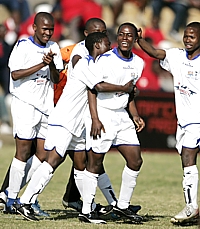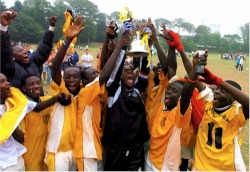Sports in Ghana

Bryan Porter
4-18-09
P.4 Hjelmgren
Ghana: Sports
When you think of an African country like Ghana, don’t you think of people in total poverty, playing soccer in fields that don’t even come to mind when you think of a soccer field and with people that are uneducated and struggling to survive? Well, then think again! As you may or may not know, Europeans and Westerners are building sports academies that not only teach Ghanaians how to play sports, but also how to become accustomed to modern civilization. That is why I believe that sports are creating a much greater opportunity for people in Ghana. What these academies specifically do is teach many poor children, often times that live in remote villages in the countryside, to read and write by having them attend school and having them play on their soccer clubs where they might be able to play on the professional level. If they don’t make it professionally, they still have an opportunity to make it into the “the world of modern economies” someday by possibly being offered scholarships to schools in Europe and America.
The organizations that build these academies are affecting primarily poor Ghanaians that live far from the civilization that we know today. One example of this would be Abu Mohammed who had only a single change of clothes (Orla Ryan). What’s so fascinating about Abu’s story is that his family at first said no to a scholarship offered to him by one of the academies because they didn’t understand what they were getting into, Also they probably wanted him to grow up in the fields and take over the family tradition. These academies that are being built are not connected to Ghana’s past history because natives, who live in the countryside, that live by traditions, aren’t used to these academies that only started popping up in the late 1990’s. The academies will most likely be part of Ghana’s future.
When Tom Vernon founded his Right to Dream Academy in 1999, he realized that soccer and an education could create a better opportunity for the people of Ghana, their families, and their community. One of the other things that sparked him to create his academy was because there was a great amount of sports talent in the Ghana area. What he does first is recruit children from areas across Ghana and offer them scholarships to attend his academy and play for his soccer club. Not all of his students come to school for free because he only has funds for around 85 total scholarships. However, that’s a large number of kids! The children attend his academy for around four years or so and hope to get offers from pro teams in Europe or schools in America or Europe (Right to Dream: other projects). A perfect example of this would be Michael Tetteh. He arrived at the academy and his skills both on and off the field took off. He was the team captain in 2004 and worked diligently in the classroom to get offered a scholarship from Dunn School in Santa Barbara, CA. After graduating in 2008, he enrolled at the University of Santa Barbara on a scholarship. You might think that that not really sports-related, but you’re wrong! One of the main reasons he even got to the Right to Dream Academy in the first place was because of soccer. And he got a scholarship from a U.S. school because of his attending the academy. From the Right to Dream Academy, there are currently two players playing in Europe and endless more to come which is impressive (Right to Dream: the sports academy so far).
So, all of this is important because now that young children, primarily boys, are getting the opportunity to play soccer and get an education, they have a much greater chance of getting a professional job or possibly even pursuing their dream of being a soccer superstar in Europe. Either way, their families are greatly affected because now, after many years of their children studying hard at college in Europe and the U.S., they have the opportunity to get out of poverty and into a more comfortable world!
While some might argue that the academies help so few people that they’re not actually having an impact on the nation. However in the ten or so years they have existed, they’ve shown that many students can use their schooling to get offers to study abroad. Others might disapprove of the fact that they serve mainly boys. However, the academies can’t be blamed for that because the European teams are primarily male dominant. Families whose children attend these academies can make a new life after they return from Europe or America and then have a much more luxurious life. After a while, more families in Ghana whose children play soccer will make more money in a wider number of professions that require advanced education, possibly getting them out of their economic despair.
Bibliography
1.Ryan, Orla. "Soccer glory offers hope to poor children." Red Orbit. 9 Feb. 2006. <http://www.redorbit.com/news/sports/385104/soccer_glory_offers_hope_to_poor_children_in_ghana/>.
This incredible source that I used got me some really god information on how the process of acquiring children into academies occurs. It also got me some nice information on Abu Mohammed who was a young man that got a scholarship from an academy to play soccer and get an education.
2."The Sports academy our story so far." Righttodream.com. Right to dream. http://www.righttodream.com/the-sports-academy/our-story-so-far
This article on The Right to Dream Academy got me some good information on how it came about and why it came about. It also has some great information the education and the goal of the academy.
3."Other Projects." Right to dream. Right to Dream. <Righttodream.com>.
This article from the same website of #2, has information on the education of the kids that attend the academy, and where they can go after the academy and how the history of the Right to Dream Academy.
Last updated by Bryan Porter May 21, 2009

